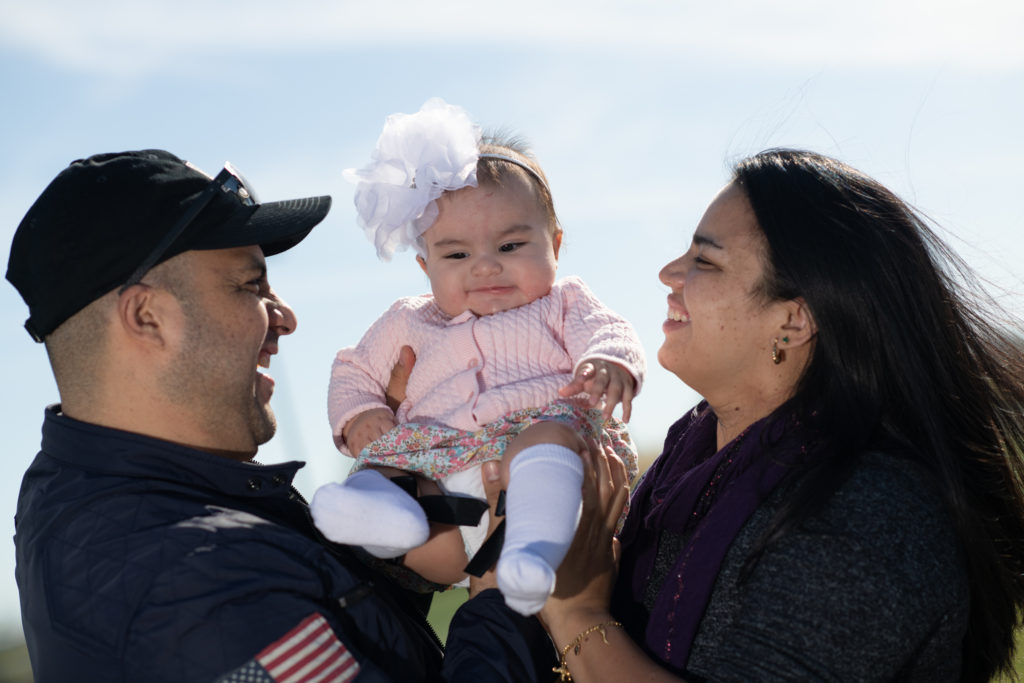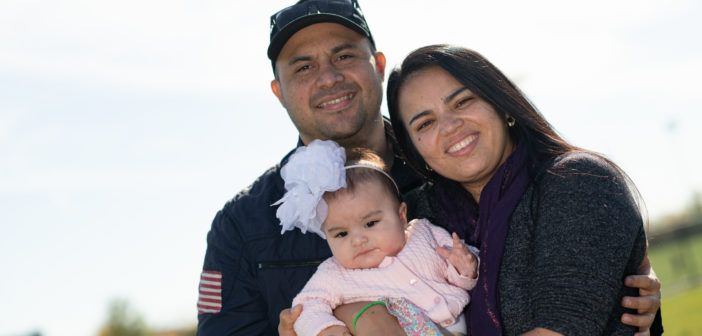When Gladis Cuadros met Gilmer Zavaleta, she told him upfront that “if you want a family, I’m not the right person for you.” She had good reason to think she would never have kids of her own—Gladis was born with a condition called cardiomyopathy, a congenital heart disease that makes it hard for the heart to pump blood. Her father suffered from the same and had died in his early 30s, making her prognosis grim. Yet Gladis may have had the same fate if not for the intervention of Newark Beth Israel Medical Center’s Advanced Heart Failure Treatment and Transplant Program’s special medical team. The program is one of only a dozen centers in the nation that has performed more than 1,100 heart transplants and is ranked among the top 15 programs in the country. Receiving a heart transplant was the miracle she needed, and now she has another miracle—Gladis and Gilmer welcomed their daughter Natalia into the world in May 2020, during the height of the COVID-19 pandemic. Receiving a new heart and being a mom have made her dreams come true. Read on for her story below.
Her journey begins
When Gladis was a teen and still living in her native Colombia, her disease slowly got worse, where she developed symptoms of dizziness and chest pain. To get the best medical care, her mother moved the family to the U.S. It was then that she learned her heart was weak, and she might need a heart transplant. But for 18-year-old Gladis knowing that a weak heart like hers would never support a pregnancy was also devastating. “I thought, ‘I’m never going to be a mom,’ so I put that idea away,” she says.
By the age of 25, Gladis aged out of the pediatric cardiac program she’d been in and transferred her cardiac care to the team at Newark Beth Israel. While the initial treatment worked well, after 5 years, the medication was less effective—her life remained in balance with the hopes of receiving a heart transplant.
Hope for a new heart
Gladis was put on the heart transplant waiting list in May 2015. Two months later, while waiting for a donor heart, her health began to fail. She went straight to Newark Beth Israel’s Cardiac Critical Care Unit, where she had daily monitoring while anxiously awaiting to hear about a heart. Since it could take days or even months, Gladis knew she had to have the strength to get through. “I wasn’t afraid,” she says. “I believe in God, and I had faith that whatever happened to me would be for the best.”
While waiting in the hospital, she crafted jewelry, hats, and purses, which helped her stay busy and keep her mind off what could or couldn’t happen. She never gave up hope, and finally, her prayers were answered—by October, she received word a donor heart was available. The miracle she was waiting for came, and she underwent a successful heart transplant. Through it all, she bonded with the team at NBI. “The transplant team was the best,” she says, “from the people who cleaned the room to the nurses and the doctors.” So much that when she was discharged, she handed out her crafts to the team as gifts.
Dreams do come true
Two years later, Gladis received the news she never thought she would hear—she could get pregnant and start a family. After careful consultation with the heart transplant team at NBI, she got the green light. “I thought it was completely OK for her to try, especially since she’d be carefully monitored by the OB/GYN team and by us,” says Natalia Hochbaum, MD, a cardiology and advanced heart failure and transplant specialist at NBI. Gladis was apprised of the risks from her doctor Martin Gimovsky, MD, a maternal-fetal medicine specialist at NBI, who’d recently helped another heart transplant patient through a successful pregnancy. “We were concerned about preeclampsia and very high blood pressure, which is more common in heart transplant patients,” says Dr. Gimovsky. “We were also concerned about heart failure. Pregnancy puts a lot of stress on the heart and the entire cardiovascular system.”
Since Gladis was on immunosuppressant medication to keep her body from rejecting the donor heart, Dr. Gimovsky carefully monitored her to make sure her levels stayed up (low levels can indicate immediate rejection of the new heart). And just like her transplant, Gladis had steadfast faith that things would turn out for the best—her immunosuppressant levels remained steady, and she never developed preeclampsia.

Gladis and Gilmer with their miracle daughter, Natalia.
A healthy future and miracle baby
As her delivery date in May 2020 approached, Gladis faced an even greater hurdle—delivering during the height of COVID-19. Since she is immunosuppressed, she has a higher risk of contracting the virus and developing severe complications. “We put in in place every precaution to ensure the least amount of risk,” says Dr. Gimovsky. These precautions included Gladis wearing a mask the entire time she was in labor and delivered, even during the pushing.
And then her miracle daughter, Natalia, was delivered in her arms, born completely healthy. Gladis was rushed to a newly renovated postpartum suite at Newark Beth Israel with Natalia and Gilmer by her side. She spent four days there, being closely monitored for symptoms of heart failure since women with significant cardiovascular disease are at great risk after the delivery, says Dr. Gimovsky. Thankfully, she and Natalia went home healthy and happy with no complications.
“Gladis was very committed to having a healthy baby, and she did her best to stay healthy. Now they’re both doing great,” says Dr. Hochbaum. Gladis credits the care she received at Newark Beth Israel—from the transplant team to the maternal-fetal medicine specialists to the delivery care—as being the reason she has her miracle family. “With the transplant,” she says, “they opened up a new life for me. Now I feel normal, and that makes me feel I can do anything.”
This post is sponsored by RWJBarnabas Health to help make every #NJMOM and her family their healthiest.










